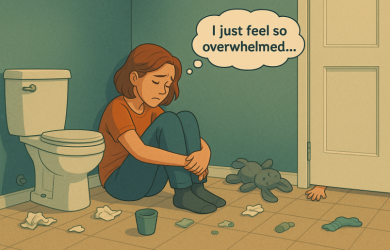What Kids Go Through When Parents Fight

Unlock Daily 30-Sec Tips for a Happier Relationship
👉 Subscribe FREEKey Takeaways
Marriage.com AI Quick Summary
No marriage can exist without any quarrel at all. Not only is it unrealistic to expect such a scenario, but it would even be considered an unhealthy relationship. When two people share their lives, there will inevitably be tension. If it goes on unresolved and suppressed for the sake of an argument-free household, it won’t teach your children how to resolve conflicts adaptively, nor will it bring you the fulfillment you wish for. Yet, when you do fight, it can be either a destructive row or an adult, healthy exchange.
How parenthood relates to conflicts in marriage
Arguments do not avoid any marriage, especially when there are children. Many studies have shown that having a child contributes to the frequency and the severity of marital disputes. Suddenly, spouses find themselves in a whirlpool of errands, responsibilities, anxieties, and changes no one could ever be prepared for.
Yes, you read about it and hear about it, but it’s not until you find yourself becoming a parent that you truly grasp the extent of the change. You become partners in parenthood, and so much of your old life (and romance) goes out of the window. You have less time for each other, and less patience for each other’s flaws.
Paradoxically, just when you need your partner to support you the most, and when you should fight as a team, you end up constantly fighting with each other.
What you should always bear in mind is that this is just a phase. You can get over it and get back to being a happily married couple. It can go on for years, though, which is why you should fight the problem proactively.
Destructive parental arguments and what they do to children
There is a good and the bad way of communicating in general. The same applies to marital arguments. You can use a disagreement to get closer to each other and express yourself while respecting the other party. Or you can, as many couples do, allow every disagreement to turn into a hard-line battle.
Destructive fights are a problem on their own in any sort of a relationship. But, when there are children watching it, it becomes more than just a stressful experience for you. It hurts your kids’ psychological well being. It can even leave permanent scarring on their young minds, one that might take years of counseling in adulthood to resolve.
So, what is a destructive conflict? There are a few strategies in an argument that parents use which were proven to harm the children’s wellbeing. It is verbal aggression (insults, name-calling, threatening to leave), physical aggression, silent (passive-aggressive) tactics (silent treatment, withdrawal, walking out), and capitulation (when you give in, but it truly isn’t a real solution).
What a repeated use of these hostile tactics does to children is it tampers with their coping skills and pushes them into maladaptive reactions. Some children become anxious, depressed, and distraught, even develop a mood disorder. Some direct their emotional imbalance outwards and become aggressive and destructive. In any case, the probability of social and academic troubles becomes significantly higher.
Moreover, as practice shows, these issues tend to persevere into adulthood. Children that come from families in which there were many destructive fights seem to learn these unhealthy patterns of interaction and transfer them into their own adult relationships. In simple terms, a child that comes from such a family has a higher chance of an unhappy marriage him or herself.
Healthy ways of arguing
You don’t need to fear an argument as if it were the greatest evil on Earth. You just need to learn and practice healthy ways of exchanging opinions. This will not merely protect your children from the stress of a messy argument, but it will be a learning experience. Your arguments won’t make your child more fragile, they will make him or her more resilient!
So, what does a healthy argument look like? The first rule to remember is – be empathetic, kind, and assertive. You’re on the same team (which is easy to forget). Always talk with respect to your spouse even when children aren’t around to develop a habit of speaking kindly to each other. Don’t attack but also don’t be defensive.
Remember, you’re teaching your children how to resolve their conflicts. They’re also learning what is alright and what isn’t. So, in essence, don’t do anything that you wouldn’t advise your children to do.
If you feel that you could use a professional help, a couples’ or a family therapist is always a great investment of time and money. That way, your entire family can enjoy constructive and fulfilling time together.
 Tips
Tips
Write your tip or submit a video tip
All tips are reviewed before the publishing.
Share this article on
Want to have a happier, healthier marriage?
If you feel disconnected or frustrated about the state of your marriage but want to avoid separation and/or divorce, the marriage.com course meant for married couples is an excellent resource to help you overcome the most challenging aspects of being married.
Recent Articles
Related Quizzes
Unlock Daily 30-Sec Tips for a Happier, Healthier Relationship
👉 Subscribe FREE on YouTube We'd love your feedback!
We'd love your feedback!
 Expert Q&A
Expert Q&A
Ask your question related to this topic & get the support you deserve from experts.



















 Thanks for your feedback!
Thanks for your feedback!